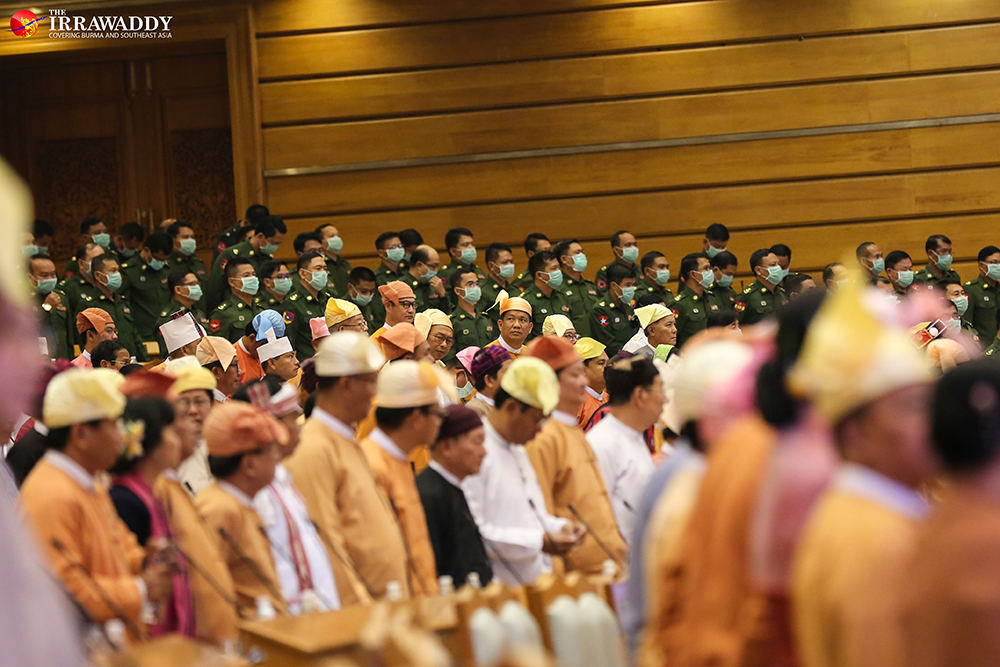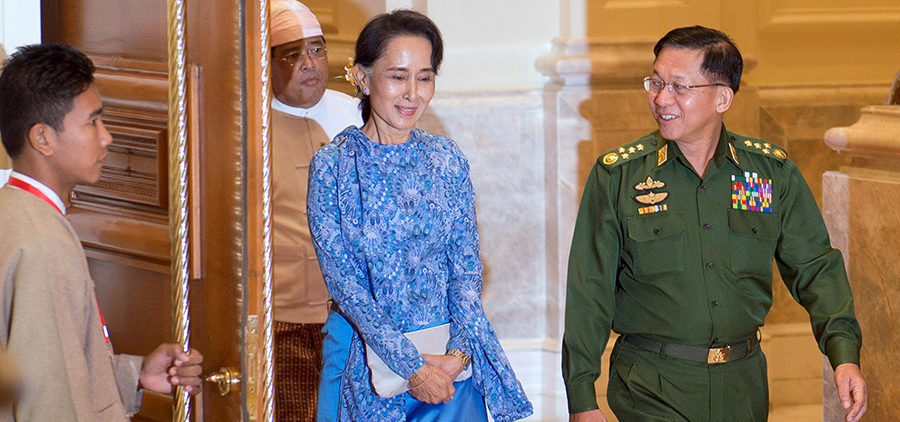YANGON—The National League for Democracy (NLD) has proposed amendments to the Constitution that would limit or revoke the special powers and privileges granted by the Constitution to the military and its chief in the legislative, administrative and judicial arenas—in short, those areas of national concern that do not deal specifically with territorial defense.
During the parliamentary debate over constitutional reform, held on seven days between Feb. 25 and March 5, military and Union Solidarity and Development Party (USDP) lawmakers strongly rejected the NLD’s proposals, warning that weakening the military’s power would have “undesirable consequences” that would negatively affect the country’s fragile democratic transition. Given this strong opposition, the amendment proposals made by the NLD have little hope of success when the Parliament votes on them next week.
A total of 149 lawmakers—50 each from the military and the NLD, 26 from USDP and the remainder from ethnic parties—took part in the seven days of debate, which was tense and often heated.
The following were the most hotly contested amendment proposals during the two-week-long debate.
Getting rid of the military’s veto over constitutional change
The main hurdle for constitutional reform is the effective veto wielded by the military, for which the Constitution reserves 25 percent of Parliament seats. Under the Constitution’s Article 436, proposed changes to the charter require the approval of more than 75 percent of lawmakers, meaning no change is possible without military approval.
Currently, the NLD holds 59 percent of the seats in Parliament, the ethnic minority parties 11 percent, the USDP 5 percent and the military its constitutionally mandated 25 percent.
The NLD has proposed changing the requirement for approving a charter amendment from more than 75 percent of Parliament to “two-thirds of elected representatives,” excluding the military appointees.

While that proposal was widely supported by the ethnic parties’ lawmakers, the military and USDP lawmakers strongly rejected it, claiming it would harm national unity and military-civil relations.
Brigadier General Maung Maung, who leads the military-appointed lawmakers in Parliament, described the proposed amendment as “discrimination” against military members appointed by the commander-in-chief.
“Such discrimination harms civil-military relations and could, therefore, hamper the national reconciliation and democratic transition the country is undergoing,” the brigadier general said.
Reduction of the military’s share of seats in Parliament
“It is too early to reduce the percentage of military parliamentarians during a time of instability,” said USDP lawmaker U Tin Aye.
The NLD has proposed gradually reducing the military’s share of seats from 25 percent to 15 percent after the 2020 election, 10 percent after 2025 and 5 percent after 2030. A quarter of all seats in the national and regional legislatures are occupied by unelected military officers under the Constitution’s Article 14 and related provisions.
During the debate, the NLD and ethnic party lawmakers stressed the importance of reducing the percentage of the military-appointed lawmakers for the country’s democratic transition.
Military and USDP lawmakers said the move could have undesirable side-effects. The Tatmadaw (military) had to make sure the country did not face crises, as in 1958 and 1962 when the nation was on the brink of collapse, they said.
Military lawmaker Major Htet Linn said it was important to preserve the military’s parliamentary presence during the period of transition, as the country was facing threats to national sovereignty, the rule of law and stability.
“Reducing the number of military lawmakers before the armed conflicts have been ended and peace is established would have undesirable consequences,” he told Parliament.
Ending the Defense Services’ political leadership role
Article 6(f) is the main article enshrining the extraordinary privileges the military enjoys in the political sphere, “enabling the Defense Services to be able to participate in the National political leadership role of the State.”
The NLD has suggested this phrase be removed, citing another charter provision, Article 4, which reads, “The sovereign power of the Union is derived from the citizens…” According to the NLD MPs, “One single organization ought not to permanently play a leadership role.” Article 6(f) is one of the most unpopular articles in the Constitution among the public.
However, the military and USDP MPs maintain that, traditionally and historically, the military’s participation in the national political leadership has been important in protecting the country from disintegration and instability, and is still needed in order to establish a “disciplined, multiparty democracy.”
‘Disciplined’ vs. genuine democracy
The heated debate over constitutional reform is often characterized as a battle between a group advocating “disciplined democracy” on one side, and a group that seeks genuine democracy on the other. Here’s why:
Article 6(d) of the Constitution identifies the “flourishing of a genuine, disciplined multi-party democratic system” as one of the Union’s primary objectives.
According to the NLD, democracy doesn’t need to be modified, hence it’s suggesting to get rid of the word “disciplined.”

NLD lawmaker Daw Zin Mar Aung said that because democracy, in practice, is accompanied by its own set of norms, there is no need to add the qualifier “disciplined” before “democracy”.
Another NLD MP, U Naing Htoo Aung, said that such qualified notions of democracy are a hallmark of dictatorship, adding that as the country is now undergoing a democratic transition, the phrase isn’t needed.
It still seems an impossibility to get the military and USDP lawmakers to agree to remove even a single word from the charter. They claim the word “disciplined” is needed because allowing an “undisciplined” democracy would result in chaos and instability.
Scrapping the army chief’s right to take power during a state of emergency
Article 40(c) of the Constitution grants sovereign power to the commander-in-chief during a state of emergency that could lead to the disintegration of the country or cause a loss of sovereign power, or in the face of attempts to take power through force, including an insurgency or other forms of violence. Critics say the article hands the military chief the power to stage a coup.
An NLD proposal that would ask the Parliament to determine how the President should take command during an emergency faced strong opposition from the military and USDP lawmakers, who said it is impossible for the legislature to work out a plan during an emergency and it is only the military that is able to preserve the Union, national solidarity and sovereignty.
“It’s funny that the Parliament should have to approve a plan for the president to take over in a situation where the president can’t control the situation,” USDP lawmaker U Maung Myint told the chamber.
“In such circumstances, it is impossible for the president to [maintain order]. Think about it,” he said.
Removal of Article 59(f), which faces the strongest objection from the USDP and military
The NLD’s proposal to remove Article 59(f), which prevents anyone with a foreign spouse or children from becoming president, has become the target of the greatest objection by the military and USDP.
The article was widely criticized as being designed to exclude State Counselor Daw Aung San Suu Kyi – whose children are British – from the presidency.

“We need to consider carefully the risks the country faces if we make a person with foreign allegiance the head of state,” said Brigadier General Tint Lwin.
During the debates, the USDP and military have even raised the fact that the country’s late independence hero General Aung San, the father of Daw Aung San Suu Kyi, first proposed such a restriction while drafting the 1947 Constitution.
NLD lawmaker Daw Yin Min Hlaing said the prohibition on foreign nationals in the 1947 Constitution only extended to the president and their parents, not their spouse and children.
She added that it is more important that the head of state be a person who is respected and doesn’t abuse citizens’ rights and freedoms, and doesn’t exploit natural resources.
The military appointees have also sought to extend that limitation to ministers and regional chief ministers in their proposed constitutional amendments.
Amendment to the composition of the military-dominated National Defense and Security Counci
The NLD has suggested amending many clauses in the charter to adjust the composition of the 11-member National Defense and Security Council (NDSC), six of whose members are from the military, as well as to reduce its power.
The NDSC—the country’s most authoritative body when it comes to making decisions on security issues or during emergencies—includes the president, two vice presidents (one of whom is military-appointed), both parliamentary speakers, the commander-in-chief and deputy commander-in-chief, the minister of foreign affairs and the military-appointed defense, home affairs and border affairs ministers.
The NLD suggested the two deputy parliamentary speakers be added, as the current 11 members include deputies like vice presidents and the deputy commander-in-chief. It also seeks to exclude the border affairs minister from the council.
But the military lawmakers rejected that proposal. Instead, jointly with the USDP, they propose to give broader powers to the NDSC.
Direct election of chief ministers
The military and USDP have debated amending the charter’s Article 261 to have regional chief ministers elected by local legislatures rather than appointed by the President.
Their proposal—which they claim was made to promote ethnic rights—was supported by some ethnic lawmakers during the debate, but the NLD lawmakers said they wouldn’t agree to it before the military’s share of seats in Parliament is reduced
If chief ministers are elected by the respective parliaments, 25 percent of military-appointed lawmakers who currently do not have any say in appointing chief ministers will have that right, they said. In some military stronghold regions, it would even give the military and USDP a chance to install their own chief minister, the NLD MPs said.
You may also like these stories:
NLD Constitutional Amendments Would Disrupt Democratic Transition: Military MPs
Myanmar Parliament to Vote on Proposed Constitutional Amendments Next Week

















